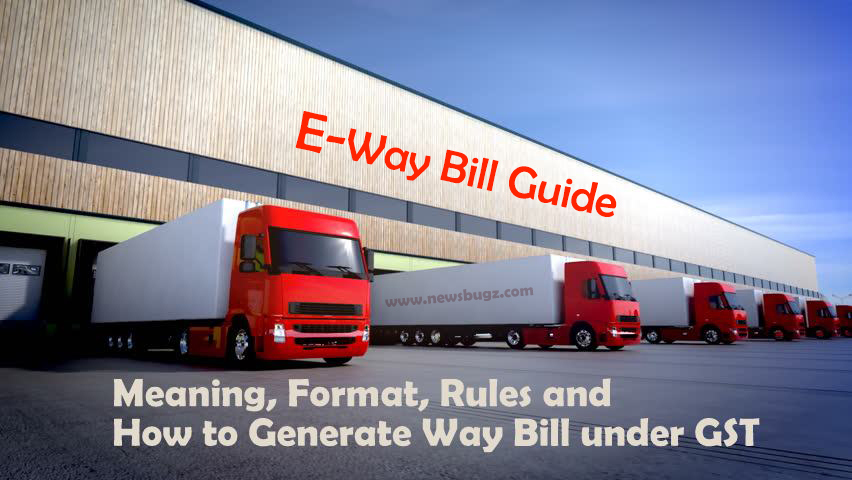GST
What is e-Way Bill? | A Complete Guide on GST E-Way Bill

On 16 December 2017, The GST Council has decided that the e-way bill under GST should be introduced in a staggered manner from 1 February 2018 and will be rolled out nationwide from 1 June 2018.
What is E-Way Bill?
The E-Way Bill is an electronically generated bill which is required for movement of goods, for valve exceeding INR 50,000 from one place to another. It should be generated on the e Way Bill Portal before the commencement of movement of goods. Even in case of inward supply of goods from an unregistered person, E-Way Bill is applicable.
The document should be generated online for transport of goods. The e-Way Bill is required for both interstate and intrastate transportations. From 1st February 2018, the e way bill for inter-state transport will be implemented in India, and for the intra-state transport, the rules will be implemented between 1st February to 1st June 2018.
Read also How to Generate e-Way Bill using E-Way Bill Portal | Ways and Rules for Generating e-Way Bill

What is e-Way Bill? | A Complete Guide to Generate E Way Bill in GST
The E-way bill can also be cancelled if the goods are not transported. The cancellation can be done either electronically on the GST website directly or through a GST Facilitation Centre within 24 hours of the generation of the e way bill. It cannot be cancelled if the generated e way bill has been verified by the transit.
When an e-way bill is generated, a unique e way bill number is allocated and is available to the supplier, recipient, and the transporter.
The Way Bill which was required under the VAT regimes is not necessary if the e Way Bill under GST regimes is generated for the transports of goods. The way bill which was required under the VAT Regime was a physical document that should be generated for the movement of goods. The electronically generated document under GST regime replaces the physical document under the VAT regime.
Read also How to Register on E-Way Bill Portal? Step by Step Procedure

E-Way Bill is required for movement of goods, for valve exceeding INR 50,000 from one place to another
E-Way Bill in Tamil Nadu is mandatory from 1 February 2018.
Features of E way Bill
- To generate e way bill easily, the user can make masters of suppliers, products, and customers.
- Multiple forms of e way bill generation for convenience in use
- Notifications and alert SMS will be forwarded to registered e-mail and mobile number of the users.
- A unified e way bill will be generated to the goods vehicle taking various consignments.
- Now it is easy to regulate e way bills generated from users account or on behalf.
- The user can further make sub-users and roles on concerning e way bill portal for creating the e way bill.
- Vehicle number can be attached by the Transporter or supplier of goods generating EWB.
- QR code will be specified on an e-way bill in order to make easy accessibility of information.

A Complete Guide to Generate E Way Bill in GST
When Should e-Way Bill be Generated?
E-way bill will be generated when there is a movement of goods, for valve exceeding INR 50,000 from one place to another –
- In relation to a ‘supply of goods’
- For reasons other than a ‘supply of goods’ ( say a return)
- Due to inward ‘supply of goods’ from an unregistered person
When goods are transported by a registered person, either acting as a consignee or consignor in his own vehicle, in his own vehicle or hired vehicle, railways or airways, either send goods outside the state or bring goods from outside the state, then e way bill will be applied.
Even in case of inward supply of goods from an unregistered person, either the recipient of supply or the transporter, the E-Way Bill is applicable.
Read also GST Return Filing Software, Hassle Free Invoice Upload To GSTN
For this purpose, a supply should be one of the following:
- A supply made for a consideration (payment) in the course of business
- A supply made for a consideration (payment) which may not be in the course of business
- A supply without consideration (without payment)
- Sale – sale of goods and payment made
- Transfer – branch transfers for instance
- Barter and Exchange – where the payment is by goods instead of in money
Therefore, e-Way Bills must be generated on the common portal for all these types of movements.

E-Way Bill is required for movement of goods, for valve exceeding INR 50,000 from one place to another
Cases when You don’t need an e-Way Bill
The e-Way Bill is not necessary when,
- The mode of transport is non-motor vehicle
- Goods transported from port, airport, air cargo complex or land customs station to Inland Container Depot (ICD) or Container Freight Station (CFS) for clearance by Customs.
- Transport of specified goods (PDF of List of Goods).
Read also GST Invoice Format and Rules | All About Invoicing Under GST
Who should Generate an e-Way Bill?
REGISTERED PERSONS
E-Way bill must be generated for every transportation with goods valuing more than Rs. 50000 to or from a registered person.
Unregistered Persons
Unregistered persons should also generate e-Way Bill. Even the supply is made from an unregistered person to a registered person, the later should meet all the rules as if he/she is a supplier.
Transporter
Any transporter carrying goods by road, rail or air, etc should generate an e-Way Bill in case the supplier has not generated the e-Way Bill.
| WHO | WHEN | PART | FORM |
|---|---|---|---|
| Every Registered person under GST | Before movement of goods | Fill Part A | Form GST EWB-01 |
| Registered person is consignor or consignee (mode of transport may be owned or hired) OR is recipient of goods | Before movement of goods | Fill Part B | Form GST EWB-01 |
| Registered person is consignor or consignee and goods are handed over to transporter of goods | Before movement of goods | Fill Part B | The registered person shall furnish the information relating to the transporter in Part B of FORM GST EWB-01 |
| Transporter of goods | Before movement of goods | Generate e-way bill on basis of information shared by the registered person in Part A of FORM GST EWB-01 | |
| An unregistered person under GST and recipient is registered | Compliance to be done by Recipient as if he is the Supplier. | 1. If the goods are transported for a distance of ten kilometers or less, within the same State/Union territory from the place of business of the consignor to the place of business of the transporter for further transportation, the supplier or the transporter may not furnish the details of conveyance in Part B of FORM GST EWB-01. 2. If supply is made by air, ship or railways, then the information in Part A of FORM GST EWB-01 has to be filled in by the consignor or the recipient. |
How to Cancel the generated E way Bill?
In the case, when E way bill not transported to the mentioned place or not transported according to the details in the generated E-way bill within 24-hours of issuance, the bill is cancelled automatically by the common portal.
The cancellation can be done automatically through a common portal or by the order of commissioner through a Facilitation Center. By logging in the common portal using the ID and password of that particular Facilitation Center, the cancellation can be done. But if the bill is verified in transit as per the rule under 138B, the cancellation is not possible.
Read also GST Rate Schedule Chapter Wise For Goods And Services | GST Rate Guide

GST E Way Bill Validity Period According to the Distance
| SI. NO. | DISTANCE | VALIDITY PERIOD |
|---|---|---|
| 1. | Less than 100 km | 1 Day |
| 2. | 100 km or more but less than 300 km | 3 Days |
| 3. | 300 km or more but less than 500 km | 5 Days |
| 4. | 500 km or more but less than 1000 km | 10 Days |
| 5. | 1000 km or more | 20 Days |

GST E Way Bill Validity
An E way bill can be Generated through sources like,
- Web-based generation through laptop and desktops with the help of browsers.
- Through Android app on a smartphone and even via SMS from the registered mobile number.
- Application program interface (API) by connecting consumers IT process with the e way bill process.
- E way bill toll through bulk generation.
- By third party service providers.
How to Generate E-Way Bill in Minutes
Click here for More GST E Way Bill Filing Updates
Incoming Related Searches
- e Way Bill in Andhra Pradesh
- e Way Bill in Arunachal Pradesh
- e Way Bill in Assam
- e Way Bill in Bihar
- e Way Bill in Chhattisgarh
- e Way Bill in Goa
- e Way Bill in Gujarat
- e Way Bill in Haryana
- e Way Bill in Himachal Pradesh
- e Way Bill in Jammu and Kashmir
- e Way Bill in Jharkhand
- e Way Bill in Karnataka
- e Way Bill in Kerala
- e Way Bill in Madhya Pradesh
- e Way Bill in Maharashtra
- e Way Bill in Manipur
- e Way Bill in Meghalaya
- e Way Bill in Mizoram
- e Way Bill in Nagaland
- e Way Bill in Odisha
- e Way Bill in Punjab
- e Way Bill in Rajasthan
- e Way Bill in Sikkim
- e Way Bill in Tamil Nadu
- e Way Bill in Telangana
- e Way Bill in Tripura
- e Way Bill in Uttar Pradesh
- e Way Bill in Uttarakhand
- e Way Bill in West Bengal




























